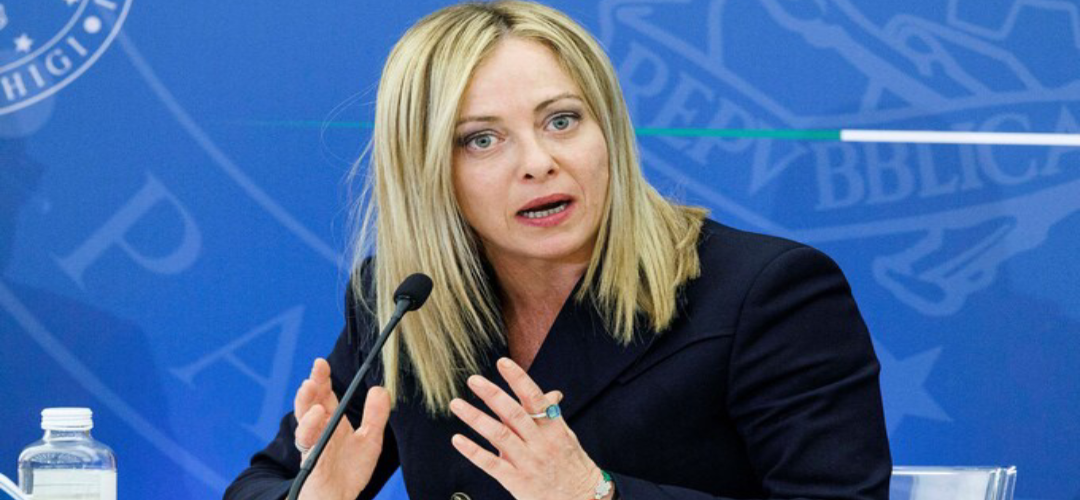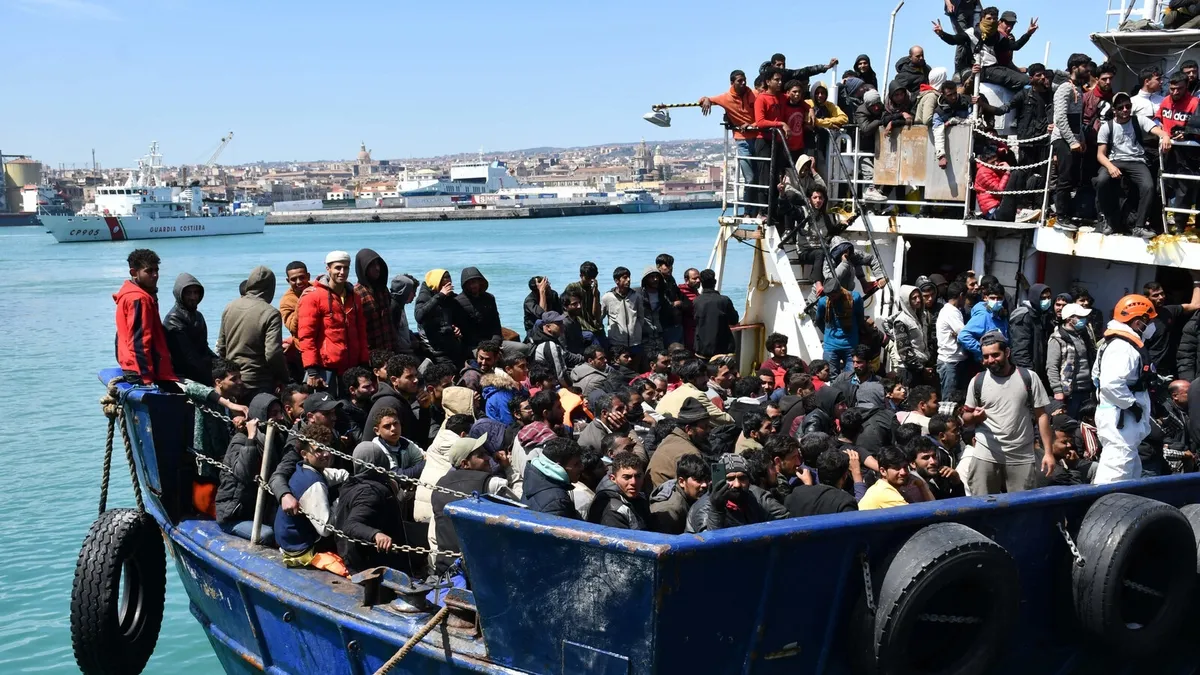Promises, Realities, and Challenges
October 29, 2023 | Expert Insights

In September 2022, Giorgia Meloni, the leader of Italy's Brothers of Italy party, campaigned for the position of Prime Minister with a central focus on immigration. With a right-wing wave sweeping across Europe, Meloni's victory in the election did not come as a surprise. However, she created a historic landmark by becoming Italy's first female prime minister.
However, as she came to grips with her exalted position, she realised that her ambitious campaign promises would be challenging. Italy has grappled with immigration-related issues for years, with a sharp rise in arrivals in 2022, marking the highest number since 2016. As the Meloni government completes one year in power, it is a good time to assess its performance on its immigration policies.
Background
In 2022, Italy witnessed a significant increase in migration, with over 100,000 individuals arriving by sea. A substantial portion of these migrants sought refuge from poverty and conflict in regions of Africa and the Middle East. Giorgia Meloni campaigned on a platform that promised to address this issue through stringent measures against unauthorised immigration, a reduction in asylum seekers, and the deportation of undocumented migrants. To curb arrivals, her government implemented increased patrols in the Mediterranean Sea and entered agreements with African nations, strategies that were put into action during her administration.
Recent public opinion polls show that over 70 per cent of Italians believe Meloni has not fully delivered on her immigration-related promises. The challenges of immigration in Italy are deeply rooted in economic disparities, political instability, the country's geographic location, and the impacts of climate change. Despite contributing positively to Italy's economy, immigration has also strained social tensions and public services.
Criticism was directed at Meloni's approach to handling migrants, particularly regarding an incident in October 2022. Her government initially denied entry to a rescue ship carrying over 200 migrants to an Italian port. Eventually, the ship was allowed to dock in Sicily, but only after an agreement with the European Union to accommodate most of the migrants. Further scrutiny fell on her government's deportation policies. In November 2022, they deported a group of migrants back to Libya despite Libya being considered unsafe for migrants. This action was widely condemned by human rights groups, who argued it exposed the migrants to the risk of torture and abuse.

Analysis
The complexities of governance underscore that Italy's immigration quandary lacks straightforward solutions. While Meloni's government has undertaken actions to address the issue, the underlying causes and the imperative for a comprehensive, compassionate immigration policy continue to present formidable challenges.
Italy's geographical location as a Mediterranean nation, economic disparities, political turbulence in migrants' countries of origin, and the far-reaching impacts of climate change, forcing migration from uninhabitable regions, collectively contribute to the root of Italy's immigration challenges.
While immigration has undoubtedly brought economic benefits, filling labour gaps in sectors like agriculture, construction, and tourism, it has concurrently strained public services and ignited social tensions. Immigrants' utilisation of healthcare and education services without corresponding tax contributions has led to resentment among some Italians. Additionally, the shifting demographic landscape has spurred concerns about Italy's identity, job market competition, and housing availability.
Resolving Italy's immigration quandary is multifaceted and necessitates addressing root causes, namely poverty and conflict in Africa and the Middle East. A comprehensive and humane immigration policy must be established. Investment in development aid for African and Middle Eastern countries can enhance living conditions, diminish migration incentives, and create opportunities for people in their home nations. Achieving successful immigrant integration requires granting access to education, healthcare, and employment prospects. Furthermore, a robust crackdown on human traffickers and smugglers is indispensable to safeguard vulnerable individuals from exploitation and abuse.
Giorgia Meloni's immigration policies have confronted the formidable challenge of reconciling campaign promises with the intricate realities of governance. Italy's geographical placement and the persistent influx of migrants have strained the capacity to effectively manage immigration. While her government has instituted measures to address these issues, it has concurrently faced criticism regarding its treatment of migrants and deportation practices. Consequently, the government's actions have generated controversy and remain insufficient to comprehensively resolve Italy's immigration concerns.
On the European stage, Italy's endeavours to prioritise immigration have yielded mixed outcomes. The European Union (EU) has made progress toward a novel immigration pact. However, these policies, particularly when viewed from an Italian perspective, could prove disastrous if implemented.
Under Meloni's leadership, the government has moved beyond mere rhetoric and taken substantive actions to confront the immigration crisis over the past year. These measures encompass stricter penalties for smugglers, improvements to humanitarian protection procedures, and the expansion of detention facilities for rejected asylum-seekers facing extended deportation waiting periods. However, these actions are seen by detractors as potentially exacerbating asylum-seekers hardships due to the integration of initial reception and detention systems.
The absence of bilateral agreements between Italy and migrants' countries of origin adds an additional layer of complexity to the situation. According to migration experts, it appears that these actions are primarily motivated by political considerations and the imperative to maintain the government's support base rather than a genuine drive to offer effective solutions. Meloni's efforts have succeeded in refocusing attention on the migrant crisis at the European level. Collaborating with EU leaders, including EU Commission President Ursula von der Leyen, Italy has championed a coordinated response and urged immediate measures to mitigate migrant arrivals.
At the EU level, progress is underway toward the formulation of a new immigration accord. This accord encompasses more stringent protocols for asylum-seekers from designated secure nations, more lenient regulations for expelling denied applicants, and the redistribution of migrants from front-line countries like Italy, Greece, and Spain to other EU member states. The central aim is to alleviate the fiscal burden on countries declining asylum-seekers, potentially offering a more equitable perspective on the crisis.
Assessment
- Italy's immigration situation is a complex one, with economic, geographic, and political factors contributing to the ongoing challenges. While immigration has brought economic benefits, it has also strained public services and caused social tensions.
- To effectively address the immigration problem, the Italian government must not only focus on border control but also tackle the root causes of migration, integrate immigrants into society, and cooperate at the European level to find sustainable solutions.
- The ongoing debate and the growing influence of right-wing populism in Italy highlight the need for a balanced and comprehensive approach to immigration, one that considers both the concerns of the electorate and the human rights and humanitarian aspects of the issue.








Comments